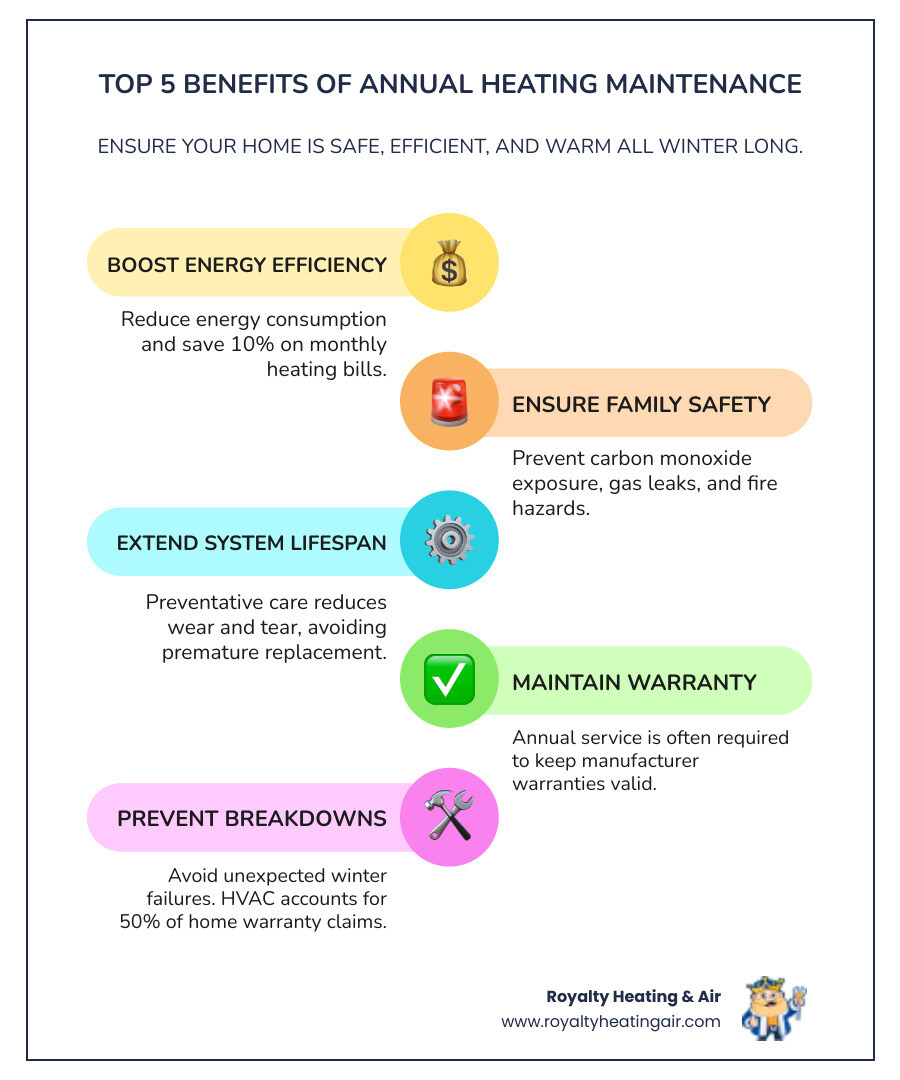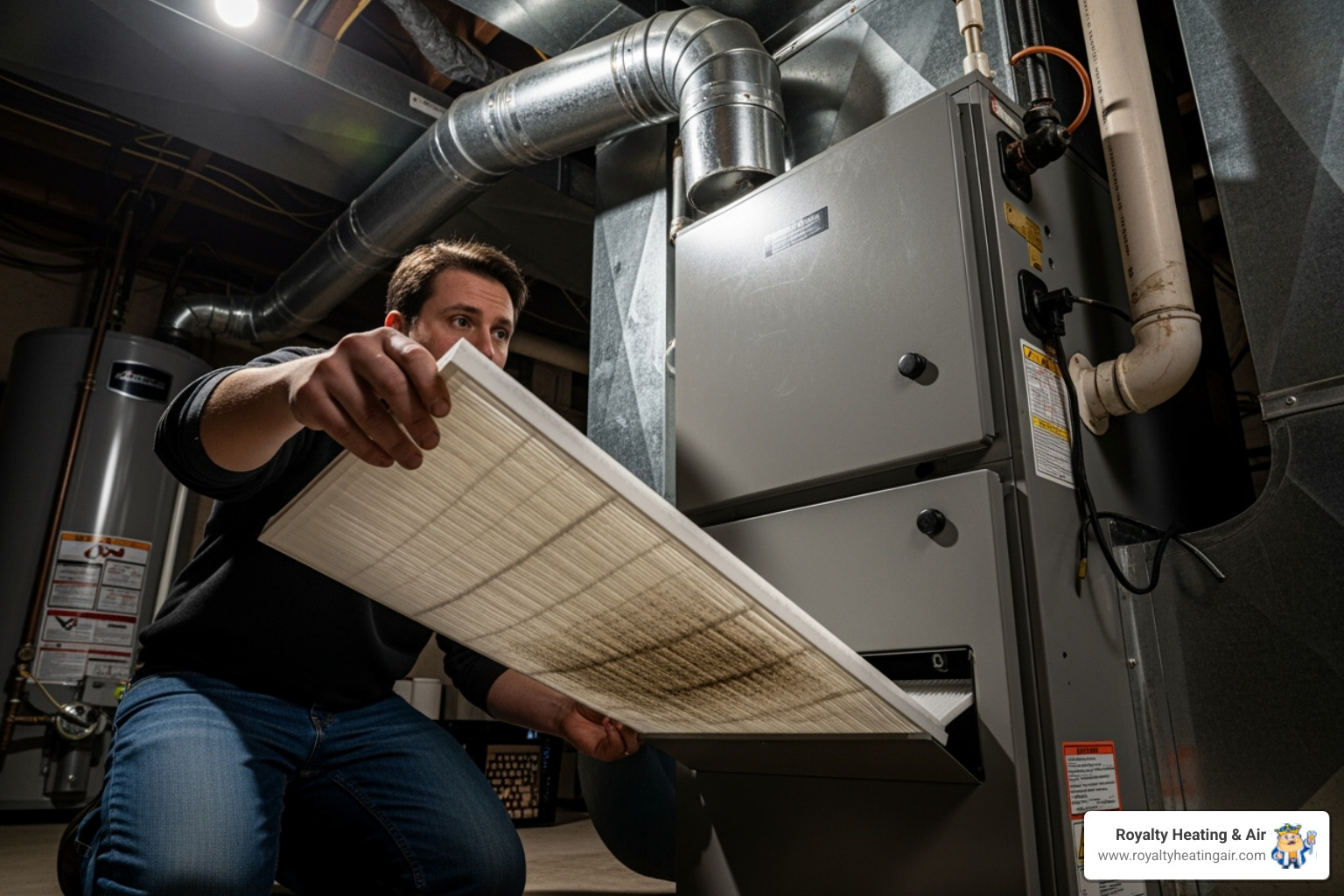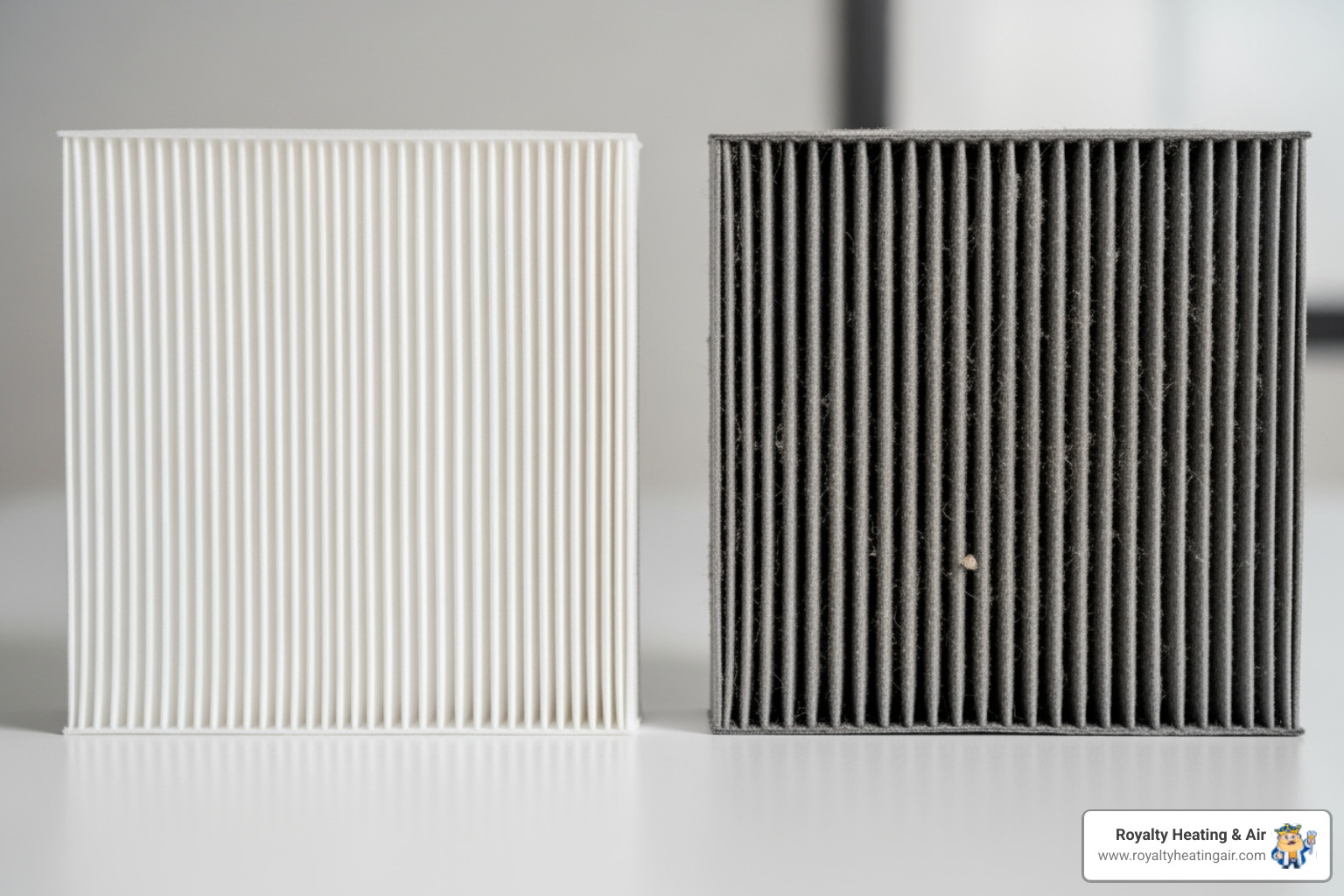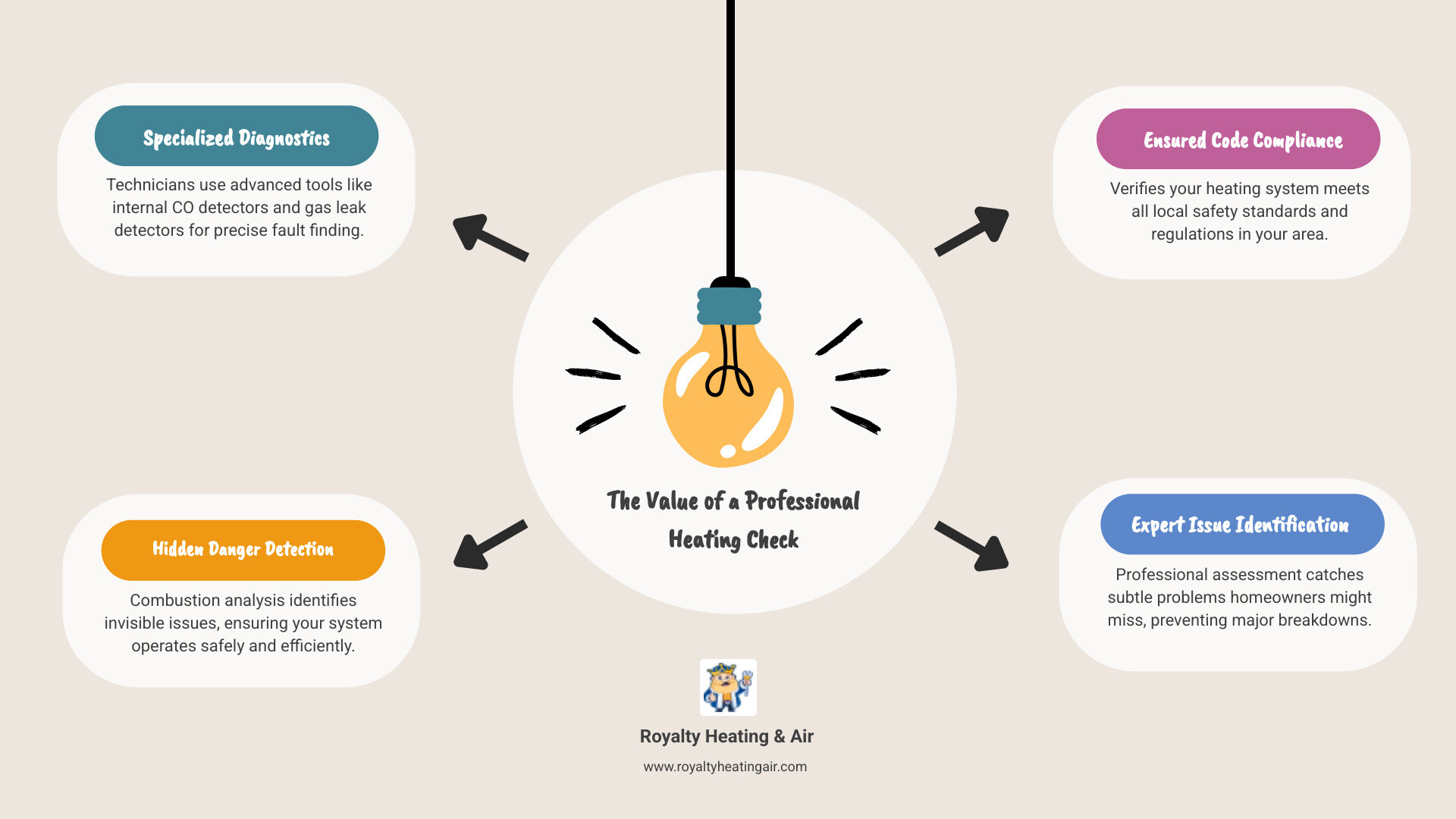A heating system check is a thorough inspection of your home's heating equipment to ensure it operates safely and efficiently before winter arrives. This proactive step prevents breakdowns, improves energy efficiency, and protects your family from carbon monoxide exposure. No one wants their heat to fail in the middle of winter, and an annual check-up can catch problems before they leave you shivering.
Essential heating system check components include:
The statistics are clear: 50% of home warranty claims are for HVAC systems, and regular maintenance can save you 10% on monthly energy expenses. More importantly, over 200 deaths occur in the U.S. each year from carbon monoxide produced by poorly ventilated heating systems.
A heating system check provides safety, savings, and peace of mind. Taking action before winter protects your family and your wallet.

Key terms for heating system check:
A poorly maintained heating system uses more energy than necessary. A thorough heating system check ensures your system runs at peak performance, reducing wasted energy and potentially saving you 10% on your monthly expenses. During a check-up, technicians calibrate your system, clean components like coils, and identify issues that force your heater to work harder and run longer, increasing energy costs.
We can also help you understand your system's efficiency ratings, like AFUE (Annual Fuel Utilization Efficiency) for furnaces and HSPF (Heating Seasonal Performance Factor) for heat pumps. A higher rating means less fuel is wasted. We assess if your older heater is still performing efficiently by checking for drastic increases in utility bills or if it runs more often than it used to.
To dive deeper into what makes a system efficient, check out this Heating System Inspection Checklist.
Safety is paramount. A poorly maintained heating system can pose serious risks, including carbon monoxide (CO) poisoning. Over 200 deaths occur in the U.S. each year due to poor ventilation of CO from heating systems. This odorless, colorless gas can leak into your home from a cracked heat exchanger.
Other dangers include gas leaks and fire hazards from faulty electrical connections. During a professional heating system check, technicians inspect these critical areas, ensuring gas lines are secure, electrical connections are tight, and safety limits are functioning. We test for carbon monoxide and verify proper ventilation, giving you peace of mind.
Preventative care from a comprehensive heating system check significantly extends the lifespan of your HVAC system. By catching minor issues early, we prevent them from escalating into major repairs, reducing wear and tear on components and avoiding premature replacement of the unit.
For example, a dirty air filter can stress the blower motor, leading to early failure. Our technicians clean and lubricate moving parts to ensure everything runs smoothly. Furthermore, most manufacturer warranties require annual professional maintenance to remain valid. Skipping these check-ups could void your warranty, leaving you responsible for the full cost of future repairs.

While no replacement for a professional heating system check, these simple DIY steps can help you catch problems early and keep your system running smoothly between service visits. You don't need special tools or technical knowledge to perform these basic tasks.
Your thermostat controls your entire heating system. First, check that it's set to heat mode rather than cool or off. Next, test its accuracy by setting it a few degrees higher than the current room temperature; your heater should kick on within minutes. If your thermostat uses batteries, replace them annually before the heating season. Dead batteries are one of the most common reasons for service calls.
Programmable and smart thermostats allow you to create heating schedules that match your routine, saving energy. If you have an old manual thermostat, consider upgrading.
Changing your air filter is one of the most impactful DIY tasks.

A clogged filter restricts airflow, forcing your blower motor to work overtime. This can reduce efficiency by up to 15% and lead to premature equipment failure.
Check your filter monthly and replace it every one to two months, or more frequently if you have pets or allergies. Note the filter size printed on the side for easy replacement.
When choosing a filter, consider the MERV rating. Higher MERV ratings mean better equipment protection and improved indoor air quality, as the filter captures more dust, pollen, and other particles.
Walk through your home and ensure all heating registers are unblocked by furniture, rugs, or other items that can obstruct airflow and cause uneven heating.
If you have an outdoor heat pump, clear away any leaves, branches, or debris around it, maintaining at least two feet of clearance on all sides.
Visually inspect your equipment for rust, corrosion, or water pooling. Also, listen for unusual noises like banging, rattling, or screeching when the system is running, as these often signal mechanical problems.
Check the condensate drain line on high-efficiency furnaces or heat pumps. A blocked drain can cause water damage, and some systems will shut down if water backs up.
This step is critical for your family's safety, especially if you have fuel-burning appliances like a gas furnace. Test all detectors monthly by pressing the test button and replace the batteries annually.
Proper detector placement is also crucial: install them on every level of your home and near sleeping areas. Since carbon monoxide is odorless and colorless, detectors are the only way to know if this deadly gas is present. Working detectors are non-negotiable for home safety.
Your heating system often provides warning signs before a complete breakdown. Ignoring these symptoms can turn a simple repair into a major safety hazard or a full system replacement. If you notice the following red flags, it's time to call a professional immediately.
A quiet hum is normal, but loud or strange noises and smells indicate a problem.
When your system struggles to maintain comfort, it's sending a message.

Sometimes your system shows you exactly what's wrong during a visual heating system check.
While DIY checks are valuable, a professional heating system check goes far deeper than what homeowners can safely accomplish. Our certified technicians use specialized tools and expertise to inspect every component, ensuring your system works safely and efficiently and catching problems before they become emergencies.
It's helpful to understand the difference between a basic check-up (inspection) and full maintenance. A check-up is a diagnostic assessment, while maintenance is the hands-on work of cleaning, tuning, and optimizing.
| Feature | Basic Heating System Check-Up (Inspection) | Full Heating System Maintenance |
|---|---|---|
| Purpose | Identify potential issues, assess safety, measure efficiency. | Preventative care, optimize performance, clean, lubricate, adjust. |
| Scope | Visual inspection, functional tests, safety checks, performance measurements. | Comprehensive cleaning, component adjustments, minor repairs, detailed inspections. |
| Actions | Test thermostat, inspect filters, check for leaks, measure temperatures, verify safety controls. | Clean burners, lubricate motors, tighten electrical connections, check refrigerant, adjust gas pressure, replace worn parts. |
| Standard | Often follows standardized procedures like DIN EN 15378 for comprehensive assessment. | Adheres to manufacturer guidelines and best industry practices. |
| Outcome | Report on system health, recommendations for repairs/maintenance, efficiency score. | Improved efficiency, extended lifespan, reduced breakdown risk, validated warranty. |
A heating system check provides a complete "health report" for your system, often leading to specific maintenance recommendations custom to its needs.
During a professional heating system check, we methodically examine every critical component:

The value of a professional assessment lies in detecting what homeowners cannot. We use specialized tools like gas leak detectors and digital combustion analyzers to uncover hidden problems.
Combustion analysis, for example, reveals how efficiently your furnace burns fuel, identifying issues long before they cause noticeable symptoms. We are also trained to spot hidden dangers, like hairline cracks in a heat exchanger or micro-leaks in gas connections that are invisible to the naked eye.
Finally, we ensure your system meets local code compliance requirements. This is especially important for homeowners in Roseville, Loomis, Rocklin, Lincoln, and Granite Bay, as we are familiar with local standards and can help ensure your system is up to date.
Here are answers to the most common questions we receive about caring for a home's heating system.
You should schedule a professional heating system check annually. The best time is in the early fall (September or October) before you need to use your heat regularly. This timing allows any necessary repairs to be made before the cold weather arrives.
Booking your heating system check in advance also helps you avoid the mid-winter rush when technicians are busy with emergency calls, ensuring your family stays warm all season.
No, even brand-new heating systems need annual check-ups. Many manufacturer warranties require proof of annual professional maintenance to remain valid. Skipping that first check-up could void your warranty coverage.
Beyond the warranty, the first professional visit confirms correct installation and optimal performance. It also establishes a baseline for your system's operation, making it easier to spot problems in the future.
Skipping your annual heating system check creates several significant risks:
A yearly heating system check is one of the smartest investments for your home, delivering significant returns in safety, savings, and comfort. You gain peace of mind knowing your system is reliable, efficient, and safe from hazards like carbon monoxide.
Performing simple DIY tasks like changing filters and testing detectors is a great start. However, knowing when to call a professional for strange noises, unusual smells, or poor performance is equally important for diagnosing issues safely.
Your family deserves a warm, safe home this winter. For homeowners in Roseville, Loomis, Rocklin, Lincoln, Granite Bay, and the surrounding areas, Royalty Heating & Air is here to help. We understand your home is where your family finds comfort and security.
We are committed to providing exceptional service while supporting our community through our partnership with the MackAttack Foundation. We believe everyone deserves a safe and comfortable home, and that belief drives everything we do.
Schedule your AC & Heating service today and let us help you prepare for a warm, worry-free winter. When it comes to your family's comfort and safety, you deserve nothing less than royal treatment.
